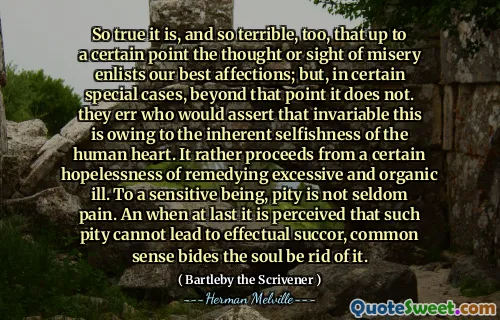"Bartleby the Scrivener," written by Herman Melville, presents the story of a Wall Street lawyer and his unusual employee, Bartleby. The narrator describes Bartleby as a quiet and efficient worker who primarily focuses on copying documents. However, as time goes on, Bartleby begins to display increasingly strange behavior, refusing tasks with the phrase, "I would prefer not to." This simple yet profound statement encapsulates his passive resistance and sets the stage for the exploration of themes such as isolation and the meaning of work.
As the narrative unfolds, the lawyer becomes perplexed and increasingly frustrated by Bartleby's noncompliance. He vacillates between empathy and irritation, trying to understand Bartleby's motivations while grappling with the challenges of managing an employee who seemingly rejects societal norms. Bartleby’s detachment becomes a mirror for the lawyer's own disconnection from human emotion and purpose, highlighting the dehumanizing effects of modern capitalism.
The story culminates in Bartleby's complete withdrawal from the world, leading to his imprisonment and ultimate demise. This haunting conclusion raises questions about the nature of free will, societal expectations, and the struggle for identity in an indifferent world. Through Bartleby's tragic fate, Melville critiques a system that values productivity over humanity, leaving readers to reflect on the profound implications of isolation, choice, and conformity in their own lives.
More »
Today Birthdays
1970 -
Shonda Rhimes
1599 -
Edmund Spenser
1940 -
Edmund White
1957 -
Lorrie Moore
1691 -
George Fox
1961 -
Wayne Coyne
1934 -
Carolyn See
1965 -
Bill Bailey
1967 -
Masha Gessen
1937 -
George Reisman
1890 -
Elmer Davis
1978 -
Nate Silver
1884 -
Sophie Tucker
1960 -
Matthew Bourne
1980 -
Maria de Villota
1977 -
Orlando Bloom
1976 -
Michael Pena
1952 -
Geoffrey Canada
1951 -
Frank Peretti
1955 -
Trevor Rabin
1808 -
Salmon P. Chase
1947 -
Robert Martin
1927 -
Sydney Brenner
1926 -
Carolyn Gold Heilbrun
1954 -
Denise Morrison
1960 -
Eric Betzig
1968 -
Traci Bingham
1919 -
Robert Stack
1970 -
Keith Coogan
1989 -
Beau Mirchoff


